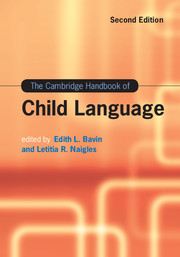Book contents
- The Cambridge Handbook of Child Language, second edition
- Cambridge Handbooks in Language and Linguistics
- The Cambridge Handbook of Child Language
- Copyright page
- Contents
- Figures
- Tables
- Contributors
- Book part
- 1 Introduction: perspectives on child language
- Part One Theoretical and methodological approaches
- Part Two Early developments
- Part Three Phonology, morphology and syntax
- Part Four Semantics, pragmatics and discourse
- Part Five Varieties of development
- 22 Language development in bilingual children
- 23 Sign language acquisition studies
- 24 Children withSpecific Language Impairment (SLI)
- 25 Language symptoms and theirpossible sources ofSpecific Language Impairment
- 26 Processing deficits in children with language impairments
- 27 Language development in genetic disorders
- 28 Language development in children withWilliams syndrome: genes, modularity and the importance of development
- 29 Language in children withautism spectrum disorders
- Part Six Reading
- References
- Index
- References
25 - Language symptoms and theirpossible sources ofSpecific Language Impairment
from Part Five - Varieties of development
Published online by Cambridge University Press: 05 November 2015
- The Cambridge Handbook of Child Language, second edition
- Cambridge Handbooks in Language and Linguistics
- The Cambridge Handbook of Child Language
- Copyright page
- Contents
- Figures
- Tables
- Contributors
- Book part
- 1 Introduction: perspectives on child language
- Part One Theoretical and methodological approaches
- Part Two Early developments
- Part Three Phonology, morphology and syntax
- Part Four Semantics, pragmatics and discourse
- Part Five Varieties of development
- 22 Language development in bilingual children
- 23 Sign language acquisition studies
- 24 Children withSpecific Language Impairment (SLI)
- 25 Language symptoms and theirpossible sources ofSpecific Language Impairment
- 26 Processing deficits in children with language impairments
- 27 Language development in genetic disorders
- 28 Language development in children withWilliams syndrome: genes, modularity and the importance of development
- 29 Language in children withautism spectrum disorders
- Part Six Reading
- References
- Index
- References
- Type
- Chapter
- Information
- The Cambridge Handbook of Child Language , pp. 545 - 563Publisher: Cambridge University PressPrint publication year: 2015
References
Suggestions for further reading
- 1
- Cited by



